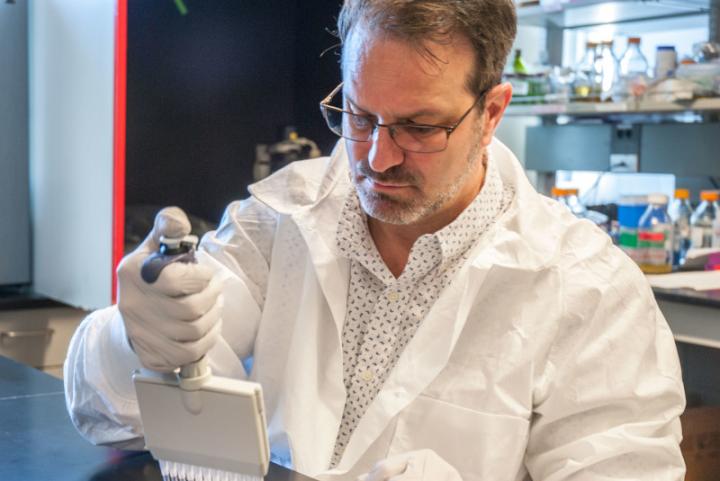Grants to support testing of vaccines and treatments for the coronavirus in NAU’s Pathogen and Microbiome Institute (PMI) and disease-intervention modeling in the Center for Health Equity Research (CHER)

Credit: Northern Arizona University
Scientists at two Northern Arizona University research centers–the Pathogen and Microbiome Institute (PMI) and the Center for Health Equity Research (CHER)–recently received grants totaling $175,000 from the Flinn Foundation in support of projects directed at responding to the COVID-19 threat.
Researchers in PMI are internationally recognized for their expertise in the genomic mechanisms of disease–and for the capacity to safely study pathogens ranging from anthrax and plague to West Nile virus and valley fever. In April, under the leadership of executive director and Regents’ Professor Paul Keim, PMI launched the new COVID-19 Testing Service Center (CTSC), which will use PMI’s Biosafety Level 3 facilities to test and evaluate the effectiveness of proposed vaccines and treatments for the coronavirus.
Several private companies and academic teams trying to develop therapeutics–but lacking the stringently regulated laboratory infrastructure for testing with COVID-19 samples–have already consulted with PMI to move their candidate compounds into initial screening for efficacy at NAU, including Vault Pharma and Oncology Venture. Flinn Foundation funding will accelerate the CTSC’s ramp-up to begin this work, led by NAU assistant professor C. Todd French, a specialist in pathogen-virulence mechanisms. The grant will also support the work of associate professor Bridget Barker of PMI.
CHER, NAU’s cross-disciplinary research center devoted to achieving health equity through research in fields including public health, epidemiology and biostatistics, is responding to COVID-19 through disease-intervention modeling. CHER director and Regents’ Professor Julie Baldwin and Joe Mihaljevic, assistant professor in the School of Informatics, Computing, and Cyber Systems (SICCS), are leading a project to model the spread of COVID-19 in rural settings like northern Arizona and the Colorado Plateau, which have much different characteristics than the urban centers of outbreak informing most existing models. The team also consists of CHER associate professor Samantha Sabo, assistant professor Ricky Camplain and senior program coordinator Carly Camplain, as well as professor Eck Doerry of SICCS.
Flinn Foundation funding will support model prototyping in the Flagstaff area that incorporates data on current behaviors and interventions and assesses the impact of a variety of potential future interventions and changes in the public’s behavior. Later in the year, the model will be expanded to look at a broader swath of northern Arizona, providing essential guidance for elected and public health officials to plan interventions specific to their region’s needs.
The Flinn Foundation supports the biosciences in Arizona through research grants and stewardship of Arizona’s Bioscience Roadmap, released in 2002 and guiding the growth and development of the state’s bioscience sector through 2025.
###
About Northern Arizona University
Northern Arizona University is a higher-research institution providing exceptional educational opportunities in Arizona and beyond. NAU delivers a student-centered experience to its 31,000 students in Flagstaff, statewide and online through rigorous academic programs in a supportive, inclusive and diverse environment. Dedicated, world-renowned faculty help ensure students achieve academic excellence, experience personal growth, have meaningful research opportunities and are positioned for personal and professional success.
Media Contact
Diane Rechel
[email protected]




